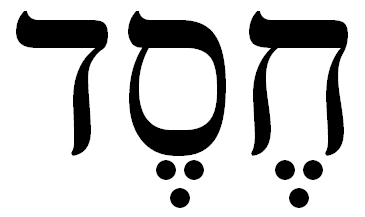The God of Israel is absolutely dependable!
Va-Yeshev
For the week of December 13, 2014 / 21 Kislev 5775
Torah: Bereshit/Genesis 37:1 - 40:23
Haftarah: Amos 2:6 - 3:8
Steadfast Love
But the LORD was with Joseph and showed him steadfast love and gave him favor in the sight of the keeper of the prison. (Bereshit/Genesis 39:21)
The more I read the Bible, the more I am impressed by how well-integrated it is. It was written over a period of 1400 years by forty different authors in three languages, using an array of literary genres, of events on three continents. While completely lacking any sense of being contrived, it possesses a most elegant inner logic. Tragically, the finely knitted continuity between its two major sections has often been lost on readers and scholars. Certainly there is contrast between the Hebrew (and Aramaic) writings, called Tenach in the Jewish world and the Old Testament among Christians, and the Greek Scriptures, by and large ignored in Jewish circles and called the New Testament by Christians. But that contrast is not one of opposing values, worldview, or the essential nature of the spirituality it reveals. Rather their main difference is one of anticipation vs. realization. For everything the Hebrew Writings look forward to, the Greek Scriptures not only confirm but bring to its fullness.
Therefore it is reasonable to assume that the teachings of the New Testament's writers would seek to apply what God had revealed in earlier times to the situations they were addressing. This is no less true for its most prolific writer, Saul, who is also called Paul (see Acts 13:9). Of all the New Testament writers, he tends to be the most misunderstood with regard to his relationship to his Jewish heritage. This is all the more tragic, since he actually provides some of the strongest threads of continuity from the pre- to post-Messianic stages of Israel's development. Known as the "Apostle (literally 'sent one,' meaning 'emissary') to the Gentiles" (i.e. non-Jewish nations), he was uniquely tasked by God to bridge these stages. Far from contradicting the older sacred writings he so highly esteemed (see 2 Timothy 3:16-17), he eloquently and effectively illumined God's ways for those who had previously been excluded from the plans and purposes of God.
An example of this is one of the most astounding statements in the entire Bible. But the way it is often quoted and discussed, one might think that the concepts behind it were brand new at the time. It's from the letter Paul wrote to the believers of Rome at a time when there were either no Jewish people there due to a recent expulsion or they were beginning to return. It reads as follows: "And we know that for those who love God all things work together for good, for those who are called according to his purpose" (Romans 8:28).
Paul is telling this primarily non-Jewish group of Yeshua followers that they could count on God's causing all the circumstances of their lives - good, bad, and in-between - for good. Whatever might be going on in the moment, it's never the end of the story. Those who love God are assured that every single thing in life is a tool in God's hands for an eventual positive outcome.
How did Paul come up with that? It wasn't a new idea. While the exact phrasing is unique, it is deeply rooted in Hebrew Scripture, particularly in the concept expressed by the word "hesed" (pronounced with an aspirated "h"). Hesed is difficult to translate into English, but I wonder if that has more to do with what it communicates than in the wording. In various English Bible versions it is commonly translated as (in alphabetical order to avoid showing preference): faithful love, grace, gracious love, kindness, love, loving-kindness, loyal love, mercy, steadfast love, unfailing kindness, or unfailing love.). Finding the right term is a challenge, because hesed denotes God's covenantally committed, unchanging positive attitude and favorable behavior towards those with whom he is in right relationship.
The story of Joseph is but one of many in the Hebrew Scriptures that demonstrates hesed. Joseph knew God or rather, God knew Joseph. Joseph loved God and was called according to God's purpose. From an early age, he had a sense of his God-given destiny, but it didn't take too long before the powers of evil bore down upon him. Yet God continued to extend to him hesed. No obstacle could get in the way of God's plans for Joseph. In fact God leveraged evil's effects to accomplish his own good intentions.
Paul understood this and other stories of God's hesed and assured the believers in Rome - and by extension you and me - that if we are in right relationship with God through faith in the Messiah, we can count on his covenantally committed, unchanging positive attitude and favorable behavior towards us.
---
Unless otherwise noted, scripture quotations are from The Holy Bible, English Standard Version®, copyright © 2001 by Crossway Bibles, a publishing ministry of Good News Publishers. Used by permission. All rights reserved.
Comments? E-mail: comments@torahbytes.org
Subscribe?
To have TorahBytes e-mailed to
you weekly, enter your e-mail address and press Subscribe
[ More TorahBytes ] [ TorahBytes Home ]

